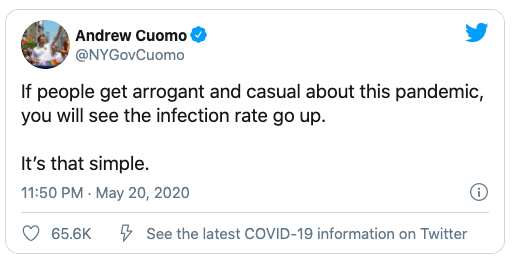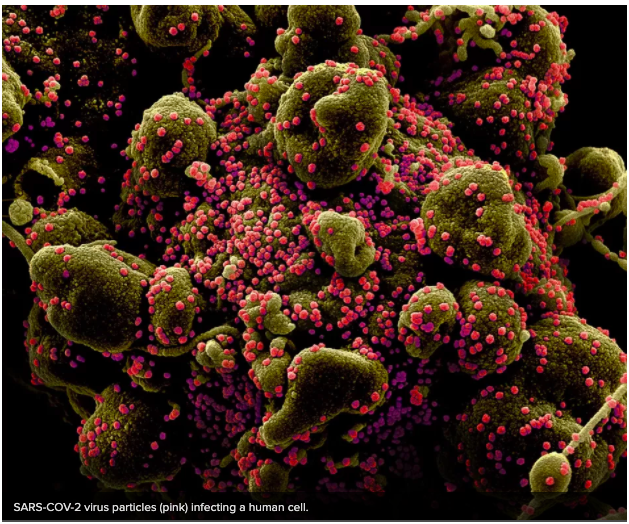为什么有些病毒会在夏天灭绝,而另一些却不会?
It's increasingly clear that summer won't quell the new coronavirus. (Sorry.)
The preponderance of research suggests warmer weather might have a small impact on slowing the spread of coronavirus, but the summer itself certainly won't end the historic pandemic. We're going to be living with this new, circulating virus — which has no proven medical treatments nor a vaccine — throughout this year and beyond, though exactly how long is unknown.
Why, however, do different viruses "prefer" different seasons, or become significantly more transmissible in summer or winter? There's no simple answer, and big unknowns remain, but there are some important factors.
"The million-dollar question is why they behave differently," said David Mushatt, the infectious disease section chief at Tulane University School of Medicine.
It's well known that the flu virus is most common during the fall and winter, and fizzles out over summer (but you can still catch it during summer). Rhinoviruses (which cause the common cold), infect most people in cooler months, too. Meanwhile, an entire family of viruses, called enteroviruses, infect most people during summer, sickening 10 to 15 million Americans annually with a variety of illnesses.
One explanation is that viruses with a certain type of shell, made out of fats (known as lipids), are more susceptible to heat, explained Mushatt. For example, flu viruses and coronaviruses have fatty exteriors. "Lipid shells are weaker," said Siobain Duffy, who researches the evolution of viruses at Rutgers University. "That makes them easier to kill." The flu, which has a more brittle shell, infects fewer people during the summer.
There's also compelling evidence that the influenza virus loses some of its ability to infect people when it travels through humid air (which is common in the summer).
The new coronavirus, too, may fall apart more rapidly when exposed to heat and humidity this summer, say on a door knob or handrail. "I wouldn't be surprised if the novel coronavirus didn't survive as well on surfaces outdoors," said Mushatt. This could decrease the likelihood of someone touching a surface and potentially becoming infected. "But that won’t stop someone from giving it to someone else," he emphasized, referencing how the virus can easily be passed directly between people in close contact, even just by talking.
When it comes to new human viruses (like this coronavirus, also called SARS-CoV-2, that only leaped from animals to humans some five months ago) the seasons and climate take a backseat to the reality that humans are really susceptible to this novel pathogen. That's because most of us have no immunity to SARS-CoV-2, and a vaccine is likely at best a year to 18 months away. So no matter what climate folks inhabit, they're highly susceptible to becoming infected with this coronavirus.
"It has everyone on the planet to attack," said Dan Janies, a professor of bioinformatics at the University of North Carolina at Charlotte who researches viruses.

 IMAGE: NATIONAL INSTITUTE OF ALLERGY AND INFECTIOUS DISEASES / NIH
IMAGE: NATIONAL INSTITUTE OF ALLERGY AND INFECTIOUS DISEASES / NIH
Coronavirus, for example, has been spreading and killing in hot parts of the world, like Brazil, Ecuador, Indonesia, and the Dominican Republic.
"The virus has just run rampant in Brazil," said Janies, noting the nation's challenges to control the virus. "SARS-CoV-2 can certainly transmit in warm, summer-like conditions."
The new coronavirus, with its weaker, fatty shell, may break down more rapidly in warm and humid environs, but that Achilles' Heel becomes relatively unimportant when the virus is allowed to easily leap from person to person when people don't social distance — especially in indoor places where groups of people are talking or socializing.
"This is a virus that we know is very happy to take advantage of people being careless," Dr. Vince Silenzio, an M.D. and professor at the Rutgers School of Public Health, told Mashable last week.
So the dominant factor that will quell the spread of the new coronavirus won't be summer. It will be people's avoidance of groups and crowded places, because it's largely unknown who is and isn't infected. Social distancing, for instance, has dramatically driven down infections in places like New York.
"Social distancing is the major factor that is going to drive an abatement in SARS-CoV-2," said Janies.